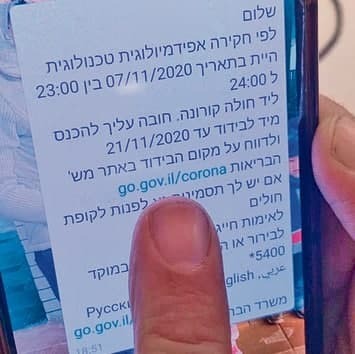Israel said on Thursday it was halting the use of Shin Bet cellphone tracking technology to curb the spread of the Omicron COVID-19 variant, following public backlash of the measure.
The government authorized the surveillance technology, which matches virus carriers' locations against other mobile phones nearby to determine their contacts, to be used for Omicron cases on Nov. 27.
That authorization will not be renewed after it lapses at midnight between Thursday and Friday, Prime Minister Naftali Bennett's office said in a statement, citing "up-to-date situational assessments".
The technology, originally developed by the Shin Bet domestic security agency, had "contributed over the last week to the effort to break the chain of infection", the statement said.
However, the statement added that possible reintroduction of the tracking will be debated according to the level of morbidity in the country.
Health Minister Nitzan Horowitz said following the decision that he "stressed from the first moment that the use of such a tool should be limited and short-term."
"Now we’re ending it, because alongside protecting [public] health, we must protect privacy and human rights, even in times of emergency."
Israel has used the practice of tracking confirmed COVID-19 patients in the early days of its coronavirus outbreak last year, insisting it was a necessary measure to keep track of the spread of infection.
2 View gallery


A message received by COVID patient after track-and-trace tech was used to monitor his moves
However, unlike previous times the tool was in use, it will be limited only to those who have tested positive for the new strain as opposed to every single confirmed virus case.
Rights groups, meanwhile, argued the measure is unconstitutional and blatantly encroaches on the civil rights and liberties of citizens.
Earlier on Thursday, Israel's Supreme Court rejected a petition by four rights groups seeking to repeal the measure.
"Considering the uncertainty around the Omicron variant and its effects..., it has not been proven that the Shin Bet authorization poses a disproportionate infringement on the right to privacy which would justify its striking down," the ruling said.
The Association for Civil Rights in Israel welcomed Thursday's decision and expressed "hope that this is the last time the secret service will be used to monitor the citizens of the State of Israel."


